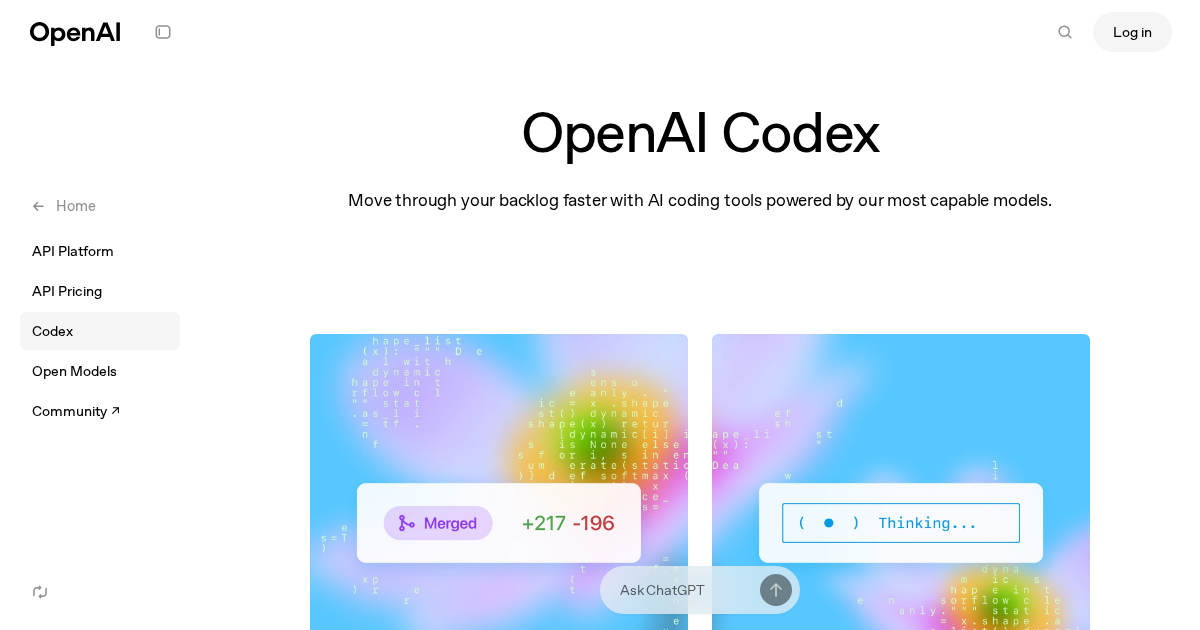OpenAI Codex
An AI system that translates natural language into code, generates and explains code snippets across many languages and integrates via an API for coding assistants.

Tool Information
About OpenAI Codex
OpenAI Codex
OpenAI Codex is an AI model designed to understand natural language prompts and generate working code across dozens of programming languages. It powers code generation, completion, and explanation workflows and is accessible via OpenAI's API for integration into developer tools, assistants, and automation systems.
Key Features
- Natural language to code: Write instructions in plain English (or other languages) and get code snippets produced in a target programming language.
- Multi-language support: Generates code in many languages including Python, JavaScript, Java, Ruby, Go, and more.
- Code completion & generation: Complete partial functions, generate whole modules, or scaffold project files from prompts.
- Code explanation: Explain what a piece of code does, help with debugging, and provide inline comments or documentation.
- API integration: Integrate Codex into applications, IDE plugins, chatbots, or automation pipelines via OpenAI's API.
- Prompt-driven tooling: Build interactive assistants that perform code transformations, refactors, or generate tests from specifications.
Use Cases
- Generate example implementations from specifications or plain-language descriptions.
- Augment IDEs with autocomplete, refactoring suggestions, or documentation generation.
- Build chat-based coding assistants to help learners and developers.
- Automate repetitive coding tasks, boilerplate generation, and test creation.
- Translate code between programming languages or modernize legacy code.
How It Works
Codex is trained on large-scale code and natural language corpora to map intent expressed in text to code tokens. Users interact by sending prompts to the API that describe the desired output; Codex returns generated code which can then be validated, executed, or reviewed. Integrations can include safety checks, sandboxed execution, and multi-step prompting to refine results.
Benefits
- Speed: Rapidly prototype and iterate on code.
- Productivity: Reduce repetitive work and boilerplate coding.
- Learning aid: Helps new developers understand patterns and idioms.
- Flexibility: Can be used in tools, IDE plugins, automation, and chatbots.
Limitations & Considerations
- Generated code may contain bugs, security vulnerabilities, or incorrect assumptions — always review and test outputs.
- Models can produce plausible but incorrect code; validation and human oversight are required for production use.
- Licensing and training-data considerations: ensure generated code complies with your licensing and provenance requirements.
- Rate limits, usage costs, and API constraints apply depending on your OpenAI plan.
Getting Started
To use Codex, sign up for access to the OpenAI API, review the documentation for the code generation endpoints, and experiment with prompts. Typical integration patterns include wrapping the API calls in your backend, adding safety and validation layers, and creating IDE plugins or chat interfaces for end users.
Security & Safety
OpenAI provides guidance and tools to mitigate risks such as malicious or unsafe outputs. Best practices include prompt engineering, output filtering, sandboxed execution, and human-in-the-loop checks for critical use cases.
Examples
- Prompt: "Create a Python function that fetches JSON from a URL and returns parsed data with retry logic."
- Result: A ready-to-review Python function with requests, retry handling, and basic error checks.
- Prompt: "Explain this JavaScript function and suggest improvements."
- Result: Natural-language explanation plus suggested refactorings and test examples.
Note: Codex is a powerful tool for accelerating development and learning, but generated outputs should be validated and adapted to your project's requirements and security standards.
Key Features
F.A.Q
Pros and Cons
✓
Pros
- + Converts natural language into working code across many languages
- + Speeds up prototyping and boilerplate generation
- + Helps explain and document existing code
- + Accessible via API for integration into tools and IDEs
- + Supports a wide variety of programming languages and paradigms
−
Cons
- − Generated code can contain bugs or security issues and requires review
- − May produce plausible but incorrect outputs (hallucinations)
- − Usage costs and rate limits apply for API access
- − Potential licensing and data provenance concerns for generated code
- − Not a replacement for experienced developers in complex systems
Reviews
No reviews yet. Be the first to review this tool!
Applicable Tasks
Promote
Share this Tool
Similar AI Tools
Discover other tools similar to OpenAI Codex.
Cursor — AI IDE for Developers
Cursor is a browser-based AI-powered IDE that combines code editing, terminal, debugging and a conversational assistant to speed up coding, debugging and collaboration.
Opal (by Google)
Opal by Google — an experimental platform with interactive AI demos, docs, and resources to prototype and evaluate AI models responsibly.
Ampcode
Ampcode provides AMP-first web development, templates and performance consulting to build fast, mobile-optimized sites and progressive experiences for publishers and enterprises.
Phoenix.new
Web-based Phoenix (Elixir) app generator — customize options (Ecto, LiveView, assets) and download a ready-to-run scaffolded project in seconds.
